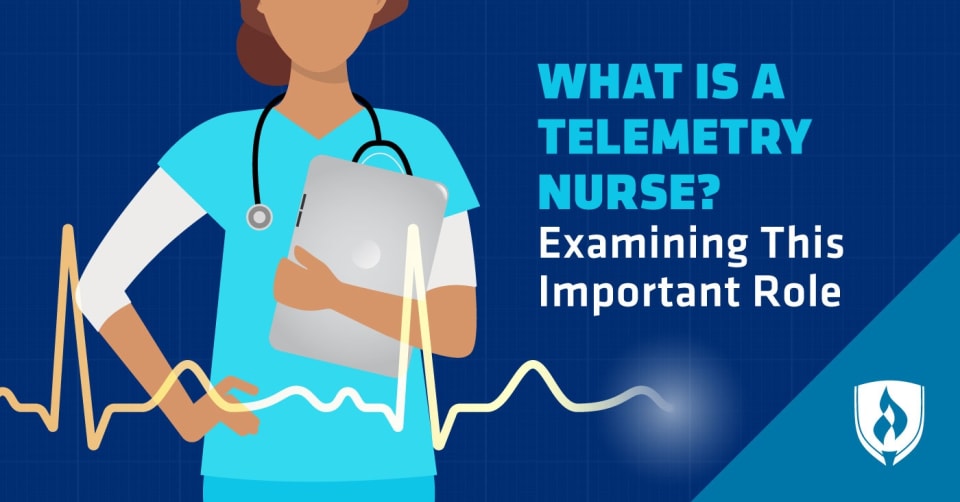
You’ve been on the path to nursing since the first time you laid hands on a toy stethoscope. While your friends started to become interested in business or digital marketing, your future remained clear: helping people heal and getting them back on the road to recovery.
But as you get closer to achieving your goal of becoming a nurse, have you considered what kind of nurse you’d like to be? Nursing is a substantial and broad pillar of the healthcare system with many possibilities for specialization. While positions like ER nurse or pediatric nurse might not be too much of a mystery, the role of a telemetry nurse is one you may not be familiar with.
We're here to fix that. In this article, we’ll take a detailed look at the role of a telemetry nurse and where this specialty fits in the healthcare system.
Get Your Nursing School Questions Answered at a Nursing Information Session
What is a telemetry nurse?
The term telemetry comes from the words tele meaning “remote” and metron meaning “measure.” In medicine, telemetry refers to the process of monitoring a patient’s vital signs where that information is collected and displayed in a central location for healthcare providers to review.
Telemetry units in hospitals are units where patients are under constant electronic monitoring. Many patients in telemetry units have experienced cardiovascular incidents like heart attacks or strokes and must be kept under close observation as they recover. Telemetry nurses monitor vital signs and rapidly respond to any sudden changes in patient status.
Work in this unit can be an interesting mix—many shifts can go by without a hitch, but the pressure and intensity can ramp up substantially if a patient’s status rapidly turns. Even without a major incident, telemetry nurses will typically have several patients to check in on, as well as the work associated with checking in new arrivals and preparing patients for discharge. Given the occasional period of high-pressure situations where you’ll need to think quickly on your feet, building experience in this unit can be an appealing way for new nurses to gradually prepare for work in the ICU or emergency departments.
What are some common conditions telemetry nurses treat?
As we mentioned before, many of the patients being monitored in a telemetry unit are dealing with cardiovascular issues—that can include high blood pressure, chest pains, heart attacks or strokes. Some other areas of medicine also employ a telemetry unit such as clinics which study sleep or neurological issues.
What equipment do telemetry nurses often work with?
Telemetry nurses are specially trained to utilize and interpret technological devices that monitor the internal functioning and vital signs of a patient. Telemetry nurses look at activities such as blood pressure, oxygen saturation, heart rhythms, and respiration.
One of the machines telemetry nurses work with most often is the electrocardiogram. The electrocardiogram, often called an EKG or ECG, monitors the electrical activity of the heart. The heart’s electrical variation is the depolarization and repolarization of the heart muscle, commonly known as the heartbeat.
Because telemetry nurses work so closely with technology such as the EKG, they develop a thorough knowledge base in interpreting the subtle changes in a patient’s vitals. These skills are transferable to many different areas of nursing and make nurses with experience in telemetry units valuable.
Where do telemetry nurses work?
Telemetry nurses work within telemetry units of hospitals. These units provide critical care and are fast paced work environments.
In the Intensive Care Unit (ICU), patients battle severe or life-threatening illness and injuries. In the telemetry unit, patients are seen as more stable but still in need of constant monitoring should the situation change. Telemetry units see a high turnover rate with patients.
Though at times a high-stress and challenging work environment, many telemetry nurses find a lot of satisfaction and fulfillment providing care and working in a close knit team of healthcare providers.
What skills do you need to be a telemetry nurse?
Telemetry nursing requires an ability to set up, review, and interpret the technology used to monitor a patient’s vitals.
In addition to this more specialized skillset, telemetry nurses need to know how to administer the appropriate critical care to their patients as statuses change. The ability to practice effective nursing requires an understanding of fields such as biology, chemistry, anatomy, and physiology.
Successful telemetry nurses are clear communicators, attentive to detail, organized, able to manage conflicting patient priorities and calm during high-intensity situations.
How do you become a telemetry nurse?
Telemetry nurses are registered nurses (RNs). To become an RN, you’ll need to first earn either a Professional Nursing Associate’s degree or Bachelor of Science in Nursing degree, pass the National Council Licensure Examination (NCLEX) and meet your state’s requirements for RN licensure. You can read more about the process of becoming an RN with our article, “How to Become a Registered Nurse.”
Once you’re established and licensed as a registered nurse, you’ll be happy to know that positions within telemetry nursing units are typically attainable for new graduates. Our analysis of over 29,084 telemetry nursing job postings from the past year found that 87 percent were seeking candidates with 0-2 years of experience.1
Interested in taking the first step toward a telemetry nursing career?
Telemetry nursing is an excellent starting point for a nursing career. It provides significant exposure to direct patient care, technology and even allows you to test the waters of working in a high-intensity nursing role when patients take a sudden turn for the worse. If you’re ready to get started on the path to becoming a registered nurse, request more information today to get into contact with an Admissions Advisor.
Not quite ready for that? Get a better handle on the variety of nursing roles you could potentially be working in with our article, “Top 25 Types of Nurses Employers Are Looking to Hire.”
1Burning-Glass.com (analysis of 29,084 Telemetry Nurse job postings, May 1, 2019 – April 30, 2020)
EDITOR'S NOTE: This article was originally published in 2017. It has since been updated to include information relevant to 2020.




